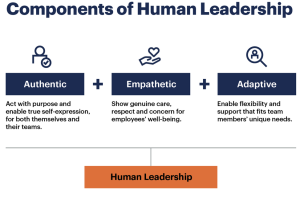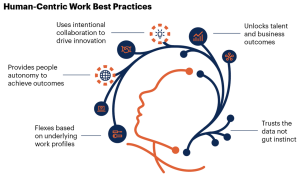What characterizes the best places to work?
Benefits are important, that’s for sure.
The opportunity for people to grow professionally is another factor.
And flexible work arrangements are also a high priority.
But in today’s shifting employment landscape, members of the Glassdoor community were quite conclusive about something else.
In nominating 2024’s best companies to work for, they indicated that culture has never been more important: specifically a culture that is collaborative, genuine, inclusive and supportive.
They also want it set by leaders who walk the talk (authentically), to achieve business success.
The role of the ‘human’ boss
It’s clear from this that there is a call for leaders – and managers up and down the line – to cultivate management styles that make the most of both hard, soft and human skills.
And let’s be clear about something else: there’s a very clear difference between “soft” and “human” skills.
So what is a ‘human’ leader?
Well, beyond the ability to effectively communicate and problem solve, a humanistic boss is one that is authentic, empathetic and adaptive.
And if you think it doesn’t matter, think again.
Gartner, Inc. has found that there is a 37% increase in employees who consider themselves to be highly engaged if they consider their boss to be “human.”
This is significant, considering highly engaged employees improve their team’s performance by as much as 27%.
The trouble is, only 29%, though, describe their boss as ‘human.’
How to cultivate ‘human’ skills



Source: Gartner
Successful leadership is obviously not just about meeting sales quotas or efficiency targets.
Nor is it about only having the skills to develop new products or manage the balance sheet.
That’s because when bosses lack human skills to go along with their hard skills, they lose talented employees and may have difficulty hiring new ones.
When this happens, all the success they’ve generated can evaporate.
So how can leaders be more ‘human’?
It’s not as easy as it may sound.
People can be trained to do accounting, or to program a computer.
But training people to be good leaders – humanistic or not – is a more difficult proposition.
It takes the ability to understand people and their individual perspectives.
The ability to motivate is key. So is the flexibility to adjust. It also takes an interest in doing all that while, ultimately, working on mindset.
Confronting ingrained mindsets
But what makes human leadership this particularly challenging is the fact that mindsets can become deeply ingrained.
It takes a special leader with experience and good judgement to know all about policies and all about employees, while recognizing that these people are not cookie-cutter simulacrum.
Recognizing people as individuals and treating them accordingly is what’s needed to get good results.
Indeed, Gartner also found that human-centric work design – “flexible work experiences, intentional collaboration and empathy-based management” – is 3.8 times more likely to create high-performing employees who are 3.2 times more likely to stay on with their employer.
Try to be more ‘human’
So, I would argue that there is an advantage to be had in helping leaders and managers open themselves to a more humanistic way of operating.
The focus should be about helping individuals, and understanding that compassion isn’t a bad thing and neither is trust.
But it’s also about encouraging a respect for human dignity, along with supporting the imperative to infuse ethical considerations into every management decision.
We have to remember that these days, leaders are made, not born. There is a tendency to assume good workers will be good managers – but that is not always the case.
Its training and providing continuous feedback for managers that’s really needed – and what’s needed to help them grow into their roles.
But if an organization can produce leaders that embrace human skills, it will not just influence improved performance and behaviors in its people. It will also establish a model for future leaders to follow.
